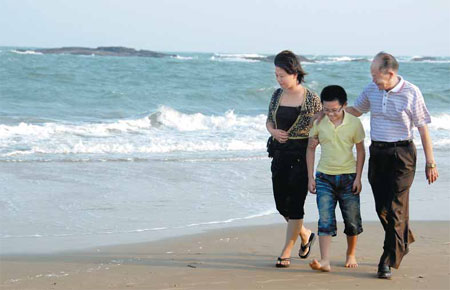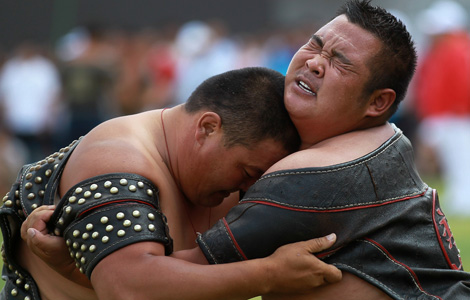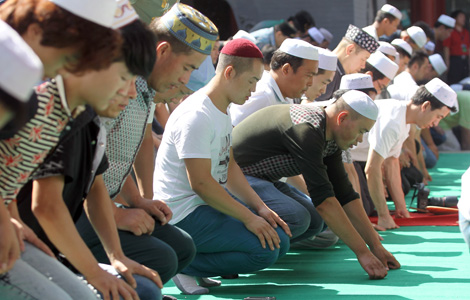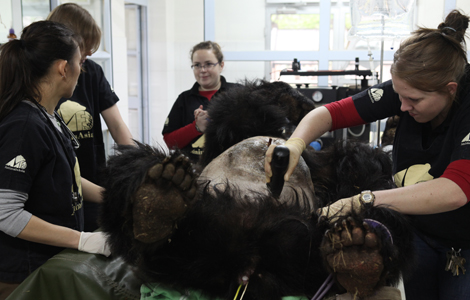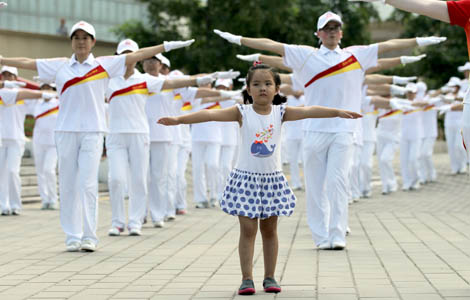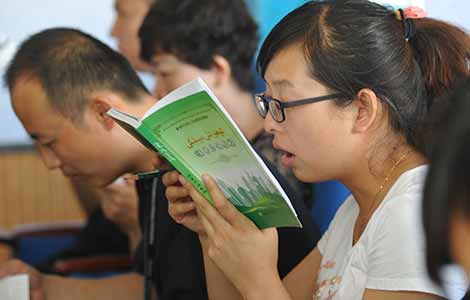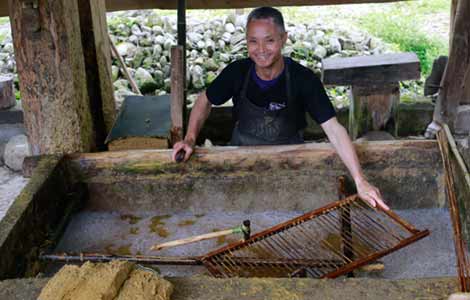Couples tie knot across Straits
Updated: 2013-08-09 07:25
By Sun Li and Hu Meidong in Jinjiang, Fujian (China Daily)
|
||||||||
|
Hong Shuangfei, with her son and father, walks on the beach at her hometown in Weitou, Fujian province. She travels from Kinmen regularly to visit her parents. Provided to China Daily |
|
Some of the 35 women from Chongqing who have married men from Taiwan. Provided to China Daily |

Love finds ways to cross differences, report Sun Li and Hu Meidong in Jinjiang, Fujian.
Hong Shuangfei is often reluctant to discuss her marriage, even though it's more than two decades since she tied the knot. The 39-year-old's reluctance stems from the fact that recalling the circumstances of the wedding can still prompt self-conscious giggles.
"My parents initially opposed the marriage, and it was as though I'd won a game when they finally agreed," she said, laughing.
The native of Weitou village in Fujian province first met Chen Ying-chao, who hails from Kinmen county in Taiwan, in 1992. Later that year, they took the plunge and Hong became the first woman from her village to marry a man from Taiwan.
The proximity of Weitou and Kinmen, and the shared fishing grounds, inevitably result in friendships springing up, and people from Taiwan regularly drop by to visit the mainland village.
"My husband was a regular guest of my father, and that was how we knew each other," Hong said.
Although her father, Hong Jiancai, deemed Chen, who sold fishery products, to be a "good and able lad", he had grave reservations about the proposed marriage.
His concerns stemmed from the fact that for many decades, Weitou was regarded as a fortress against Taiwan.
One-China policy
In the 1950s, the village was of immense strategic importance to the defense of the mainland in the event of an artillery attack by the Kuomintang, which fled to Taiwan in 1949 in the wake of their defeat in the Chinese civil war (1945-49). Indeed, in 1958 the village was almost reduced to rubble by a massive bombardment.
Hong Jiancai, a war hero and former militia leader, was worried that cross-Straits relations would become tense and fractious and have serious ramifications for his family. "If a war occurred someday, would my role as a former mainland soldier jeopardize my daughter's situation in Taiwan? A conflict would probably mean that I would never see my daughter again," he recalled.
When the two sides reached a consensus in 1992, in which both agreed to abide by the one-China policy, Hong Jiancai began to bank on peaceful relations and gave the green light for his daughter to marry Chen.
However, his wife, Jiang Meili, argued that cultural differences would make life in Kinmen hard for Hong Shuangfei. She was also concerned that she would lose contact with her daughter because of the difficulties experienced by mainlanders who wanted to travel to Taiwan.
"I allied with my father to convince my mother that things wouldn't be that bad," said Hong Shuangfei, adding she promised to visit her mother regularly, irrespective of the inconvenience.
"As it turned out, things were really not bad at all," she said.
The links between Weitou and Kinmen are deep; the forefathers of many Kinmen residents hailed from southern Fujian and so the language, food and culture are similar. "Even our god is the same. We all worship Mazu, the Chinese goddess of the sea," said Hong Shuangfei. However, she remembered that one of the few problems she encountered after relocating was that some people in Taiwan didn't understand the mainland very well.
"Many people came to check on me and were surprised that I actually looked nice. They thought people from the mainland were all hillbillies," she said, adding that she wanted to take them to the mainland to see the reality for themselves, but was discouraged by the travel difficulties.
Unlike Kinmen residents, who could travel to the mainland by sea as long as they owned a boat or fishing license and an ID card, people from Weitou had to apply for official approval before traveling.
If approval was forthcoming, prospective visitors had to travel to the coastal city of Xiamen, then fly to Hong Kong and transfer to another flight to Taipei before finally arriving at Kinmen. The seemingly straightforward journey usually lasted two days.
'Mini three links'
A smoother path was paved in 2001, when a policy known as "mini three links" was adopted and allowed direct ferry services between Fujian's coastal cities and Taiwan's offshore islands of Kinmen, Matsu and Penghu.
"The original two-day-odd trip has since been shortened to a two-hour journey, and I visit my parents twice a month," said Hong Shuangfei.
With two sons and a profitable cosmetics store in Kinmen, Hong said she doesn't care about her status as the first Weitou woman to marry a Taiwan resident. Instead, she values happiness above all other things and believes she has attained it.
Following in her footsteps, many Weitou women have married men from Taiwan. Hong Shuiping, the village head, said 134 women have wed men from Taiwan and more than 30 of them have moved to Kinmen. Others have settled in Penghu, Kaohsiung and Taichung.
While Hong Shuangfei has never regretted her decision, not every mainland bride has enjoyed married life in Taiwan.
Most of the first batch of mainland brides married veteran Kuomintang soldiers. Those men unable to find spouses in Taiwan were allowed to return to their hometowns after 1987, when the mainland and Taiwan resumed interpersonal relations, to look for brides.
"Most mainland brides married former soldiers and were much younger than their husbands. Many of those women were divorcees who wanted to change their lives through marriage," said Lu Yuexiang, chairperson of the Chinese Production Party, a political party in Taiwan that focuses on equality and rights for mainland brides and other new arrivals.
Lu, 49, from Longyan in Fujian, was one of the earliest mainland brides to arrive in Taiwan and although she didn't marry a veteran but a businessman she had met through a matchmaker in 1992, she had a hard time fitting in during the early years.
Long-standing cross-Straits confrontations, allied to social and economic differences, meant mainland brides often faced discrimination. Some Taiwan residents considered the marriages to be bogus and thought the women were motivated by financial considerations, according to Lu.
"Because of my status as a mainland bride, vegetable vendors at the market often ignored me and I was once turned away while trying to see a doctor," she recalled.
Mainland brides also faced discrimination when applying for ID card registration and permanent residence rights.
It took Lu nine years to obtain an ID card in Taiwan. Even now, mainland brides have to wait six years before being granted one, two years longer than Filipino or Vietnamese brides. Without the card, the women cannot work legally or receive social insurance.
Realizing that the number of mainland brides was rising rapidly and hoping to save them from the difficulties she had experienced, Lu founded her party in 2010. It provides aid and advice to mainland brides with issues such as residency and employment, and lobbies for authorities to improve the situation.
Jiang Yanzhen, 25, who met her husband via a social networking site and married in 2012, said the entire marital process was sweet, with the exception of the "lengthy and painstaking procedures" required when she applied for permanent residence in Taiwan.
The native of Longyan city in Fujian, who now lives in Taiwan's Xinbei city, said gaining right of residence requires the applicant to provide a certificate to prove they don't have a criminal record.
"To get the certificate, I had to run between the public security bureau in Chengdu, Sichuan province, where I spent my college years and the bureau in Xiamen, where I have hukou (household registration)," said Jiang.
The landscape design major added that her qualifications are not recognized in Taiwan, and warned graduates of mainland universities that they should expect to work harder than local residents to find a decent job.
"But nothing is really a problem when you have love backing you up," she said.
Wei Jinhe, a matrimonial expert with the Cross-Straits Marriage and Family Association, the mainland's first organization dedicated to providing marriage counseling services to cross-Straits couples, said marriages of this sort are now on a fast and positive track.
More than 10,000 cross-Straits marriages are registered every year and in excess of 10,500 couples married in 2012, according to China's Ministry of Civil Affairs.
The first cross-Straits marriage was recorded in 1989 in Xiamen and since then more than 340,000 mainland residents have tied the knot with people from Taiwan.
Against a background of rapid economic growth on the mainland and frequent personal exchanges, cross-Straits marriages have become increasingly common, said Wei.
Peaceful development
"People meet in a variety of ways, from matchmaking to social networking. The age gap between couples has narrowed and, most important, people are getting together for love, not money," he added.
Although some policies have been revised to better protect the interests of mainland spouses, problems such as education, overstaying visas and employment issues, still exist, according to Wei.
At a recent media briefing, Yang Yi, a spokesman for the Taiwan Affairs Office of the State Council, said he hoped Taiwan will soon rectify the discriminatory polices that affect spouses from the mainland. "Cross-Straits marriages have contributed to the peaceful development of relations between the mainland and Taiwan," Yang said.
While attending the 2nd Cross-Straits Marriage and Family Forum, which was held in Xiamen in June, Dou Yupei, vice-minister of civil affairs and president of the Cross-Straits Marriage and Family Association, said the organization will work to remove barriers on cross-Straits marriages this year.
The number of counselors trained to provide marriage-counseling services for mainlanders who have married, or are planning to marry Taiwan residents, will be increased.
The association will collate requests and complaints from mainland spouses and work with government departments to solve their problems, said Dou.
He said the association has given feedback to the relevant bodies in Taiwan and has urged them to produce new policies that better safeguard the rights of cross-Straits couples and create a sound foundation for their future happiness.
Contact the writer at sunli@chinadaily.com.cn



(China Daily USA 08/09/2013 page6)
Most Viewed
Editor's Picks

|

|

|

|

|

|
Today's Top News
Pharm giant says it takes bribery claims 'seriously'
China's inflation rises 2.7% in July
Budget show cuts in provincial spending
US realty market 'connects dots' with China buyers
Pharm giant suspected of bribery
Economic prospects improved
Beijing rejects protest over patrol
China Unicom tests 4G network
US Weekly

|

|
